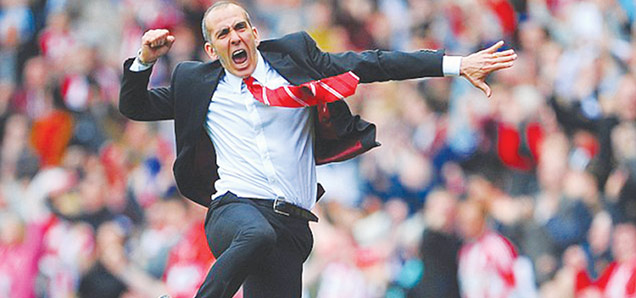Premier League Ponderings: Di Canio dismissed: Player power or player rights?
 CREDIT: DAILY MAIL
CREDIT: DAILY MAILPaolo Di Canio was sacked from his position as Sunderland manager after just 17 games, with his players refusing to play for him.
When I began to write this column, I knew that at some point not too far long down the line I would have to touch on the topic of a manager being sacked from their position due to poor results in the Premier League. Recent seasons have seen the job of a manager in England's top flight become increasingly unstable; during the 2012/13 season, six managers were relieved of their duties, leaving only five managers that have held their posts for more than two years at the start of this season. The trend seems set to continue this year, as Sunderland terminated the contract of their manager, Paolo Di Canio, just five games into the season.
With such a massive amount of turnaround, writing about the first managerial casualty this season was inevitable. Thirty-eight games is a very long time for board members to look at their team propping up the rest of the division, and the feeling that a change needs to be made immediately is often one that is too strong to ignore. While the treatment of managers is a topic that has been debated to death in the wider football community, with many analysts feeling that boards are too quick to pull the trigger and attempt to bring in someone new to save the team from relegation, the reasoning behind the first sacking of the season raises question about who the board will truly stand behind in a time of crisis, the manager they hired, or the players that are responsible for delivering results week in week out.
Di Canio, an unpopular choice from the day he walked into the Premier League last March, has long been known throughout his time as a player and a manager as a controversial character back in his native Italy. He is a known supporter of fascism, referring to Benito Mussolini as “deeply misunderstood” in his autobiography, and his political stance caused friction at the club from the outset, with Labour party MP and club vice-chairman David Miliband to resign from his position, citing the new manager's political views. Various media outlets soon began to report a mood of unrest beginning to fester at the club, based in the working class English north where the integrity and values of a team can affect its worldwide reputation.
Immediately following his dismissal, club CEO Margret Byrne took an unusual step for a board member at a football club, instead of throwing around the term “mutual consent” or stating, “We appreciate what the manager has done” to address the sacking, she confirmed what many outside people suspected: the players had turned on their manager, refused to play for him again, and won. Reports that the manager had taken to running the club like his own personal dictatorship, ordering non-coaching staff to not speak with the players for example, coupled with his propensity for insulting his players in press conferences, had finally seen a number of the club's senior players go to the board and inform them that they would refuse to play for him again.
The idea that players would be able to influence the status of a manager's job spells nothing but negative possibilities in an era where players seem to be more entitled than ever before. There were reported problems at Chelsea FC two seasons ago, resulting in the sacking of a trophy-winning manager, due to him benching some of the more senior players, including club captain John Terry, because they were sulking about not being played. The owner relented, firing his coach despite the successes that he had brought to the team. A manager should be the one who is in charge of the team, not the other way around, yet many could argue that the Sunderland players were standing up for their own rights. For the CEO to confirm that the manager was being relieved of his job due to a player revolt is an unprecedented move in English football, but one that will hopefully not start a precedent to fire managers simply because people are unhappy.













